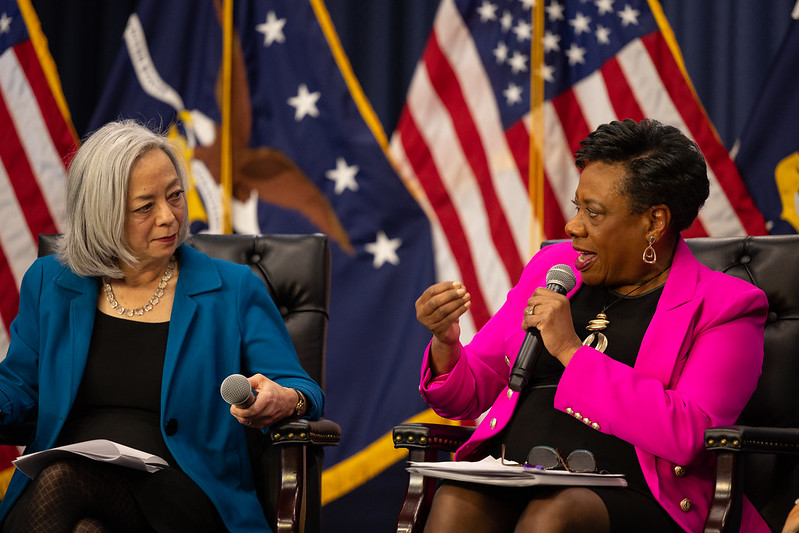On June 29, the U.S. Supreme Court struck down affirmative action practices at Harvard University and the University of North Carolina. In the days since, the ruling has been met with stinging criticism from the presidents of the two most powerful teachers unions, Randi Weingarten of the American Federation of Teachers (AFT) and Becky Pringle of the National Education Association (NEA).
In a Twitter Spaces online, audio-only discussion event hosted by the progressive group Alliance for Justice, both Weingarten and Pringle blasted the Court. Weingarten emphasized that the Court’s ruling was “horrible” and immediately drew a connection to her interpretations of history.
“What this decision does is basically ignore the original sin of slavery and the effects of that original sin and pretends that there is no longer an effect to it,” Weingarten affirmed. “And [it] basically says that equal protection means whatever the dominant power play is right now, that’s what should be happening in America.”
Weingarten claimed that the Court “is no longer calling balls and strikes” and is too busy “making law that is quite ideological.” In her words, “Our job has gotten both harder and easier in the last couple years because of these decisions — a dynamic she attributes to the public having “no confidence in the Court.”
She added that the ruling “throws a wrench into all that progress,” and she said it demonstrates that the Court has “a fundamentally different view of equal protection.”
Pringle agreed with Weingarten and called the ruling a “gut punch” because, “We’re having Supreme Court decisions that are taking us further backwards in the progress that we made,” she said.
Their rhetoric is a stark contrast to the reactions of Asian-Americans, parental rights groups, and academics. A Chinese immigrant to the U.S., Yukong Zhao, said the ruling “marks a sweet but long-fought victory for the Asian community.” Kenny Xu, president of Asian-American activist group Color Us United, told the press, “I’m ecstatic about this decision. It means that Asian-Americans can finally get treated on their merits.”
A parental rights group, in a statement, said the Court’s ruling “reiterated that discrimination is illegal, be it directly or by proxy.”
Also, retired Vanderbilt University professor Carol Swain stated the ruling “can really set us on the path of healing race relations rather than the divisiveness of race-based affirmative action.”
Both union presidents highlighted their ambitions in fighting for justice in light of the ruling.
Weingarten said, “At the end of the day, those of us in education, and frankly for those of us in Labor … we fight for a better life for everyone. Neither of us are going to stop fighting for what kids and communities need to succeed,” Weingarten said. “Whether that kid is dyslexic or scarred by social media issues or, frankly, whether that kid, because schools were closed for a long time, has issues because of that.”
Those words stand in stark contrast to her and her union’s actions, such as when AFT handcrafted school shutdown policies at the Centers for Disease Control (CDC) federal agency in early 2021. Based on released emails, AFT sent a list of suggestions (which included closing schools) to the CDC, and the CDC adopted much of the AFT’s list in their final public health guidance that kept schools closed.
Pringle echoed a similar perspective to Weingarten’s on the subject of justice. “As unionists, we’ve been fighting for decades around social and racial justice,” the NEA president said. “That was a core of the vision I laid out for the organization … in transforming our public education system.”
The two union presidents also discussed their opinions about the student debt issue.
Weingarten called the current higher education system “a caste system” and said it is the country’s duty to “make sure that people can afford it and not be pauperized by it.” Pringle said that there is evidence that forgiving student loan debt leads to a “stronger economy” and should be expanded to “include room and board, childcare, and elder care.” But Pringle failed to cite any specific evidence to back up her claims.
However, their opinions on student debt are not shared by everyone.
Elizabeth Stelle, director of policy analysis at the Commonwealth Foundation, pointed out that student debt is exacerbated by “mushrooming university administration costs, fueled by generous federal and state subsidies.” Stelle added, “We need to overhaul a system which rewards schools for increasing administrative costs, constructing new buildings, and raising tuition.”
